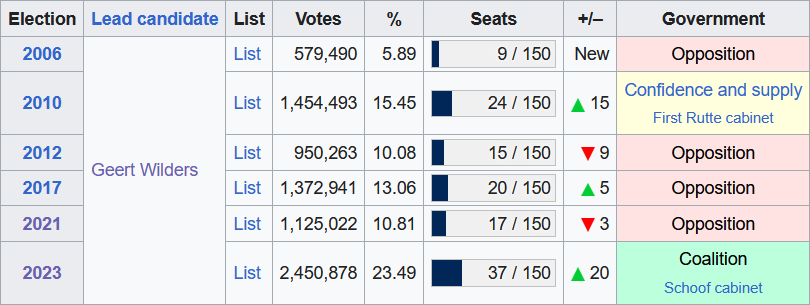The Trump phenomenon
The history of democratic countries is full of surprises, as is all history. History is completely recalcitrant to any sort of scientific analysis. You can’t possibly look at a country’s history and predict what comes next. You can’t possibly look at the Republican Party in the wake of Romney’s defeat and conclude the obvious next step is to select the candidate they ended up nominating. Even Trump himself was probably unsure until John Oliver gave him the encouragement he needed to give it a go.
But from the moment the “King” (Just kidding btw… Unless?…) descended from his tower, people knew—or at least believed—how this would end. Trump was just too much of an anomaly to win the GOP primary, until he did. But even then, he was much too controversial to win in a general election, until he did. Trump as anomaly was almost completely disproven by that point. That was until the man lost 2020 and became the first one-term president since Carter1. Finally all our suspicions have been proven true. Trump really is too controversial to sustain his movement. We can finally return to Normalcy™.
An international perspective
To Americans all of this felt extremely anomalous. But if you pay attention to the rest of the world (not America’s strongest suit), you would have seen this all coming. Because while the rise and fall of political parties is incredibly unpredictable across time, it is equally as predictable across nations. Every Western democracy has more or less the same history.
1800s: struggle between liberals and “conservatives” (monarchists)
~1900: “social democrats” (really socialist) enter politics and the main right win party becomes liberal. (This switch is why the main right wing party in Denmark is called Venstre, “the Left”.)
Post war: “social democrats” become actual social democrats as we use the word today.
70s-80s: The neoliberal turn pushes the Overton window to the right on economics and conservative parties get elected on its back
90s: social democrats adapt to the neoliberal turn by becoming more pro market, but distinguish themselves by being more progressive culturally. For example. Immigration rates skyrocket. The hardline lefties split and form a separate party. Around the same time people start noticing that climate change exists and a green party gets founded.
2000s: Immigration creates backlash, right wing populists start contesting elections with increasing success.
This happened all over Europe. The dynamics in the United States are much the same. And it should have been a surprise to no-one that the same things would happen stateside, including that last bullet point.
“Now hold on”, you might say. Isn't America—*eagle sound*—exceptional? America doesn’t have any gay and/or European social democratic party. Because Americans—*eagle sound*—love freedom. But that’s illusory. America has a social democratic party; they’re called the Democrats. The only special feature America has is that their social democratic party isn’t called “the Social Democratic Party” or “Labor” and instead inherited the name of a nineteenth century pro-slavery party. Which—granted—is still quite unusual as far as social democratic parties go.2
The reason this could occur is not because something unique about the American people or their culture. Instead, it’s a consequence of its peculiar political institutions. Most European parliaments are elected by an approximally proportional vote and therefore permit of multiple parties. America in contrast has had the same two parties since the presidential election of 1856. Those parties have been very strongly esteblished, not only structurally (by FPTP voting), but also in the minds of voters. Any new movement that wants to esteblish itself needs to engage in entryism in respect to the existing parties. Anyone that tried otherwise has been relegated to obscurity. Socdems effectively took over the Dems. Populist (really just Trump) are (is) doing the same to the GOP, this is only natural.
Dynamics in Australia, Canada, and the UK are similar. Although third parties have more of a fighting chance there. That is, they usually elect at least some members to the legislature. This gives them a food in the door and the status and relevancy of a “national party” I attribute this to the relatively diminutive size of their elecctoral districts as well as their ungerrymandered nature. The law of large numbers make it really hard for a minority party to gain hold in district with as many as 700 000 inhabitants. Even if they ever came close, the main two would just arrange to gerrymander them out of existance.
But why have the “Tory” parties of these respective places not been taken over by populists? Nigel Farage and Maxime Bernier have to run their own seperate parties, with little electoral succes. Simply put: They don’t have primaries. The GOP would naver have chosen Agent Orange as their candidate if they were they had been empowered to make that decision. Indstead, that choice was left to the voter. The voter chose.
This unique combination of political institutions lead to a unique result. Nowhere in the developed world do right-wing populist rule unilaterally, but the United States. This is not because Americans are more populist than other peoples. About one fourth of voters are MAGA, in line with populist popularity elsewhere. But elsewhere that quarter of your voter base doesn’t create a path to unilateral power.
In proportional systems for example, that quarter of votes only grants you one quarter of the legislature. Which means you have to form a coalition with milquetoast centrist to govern. Those milquetoast centrist will obviously cut away your most radical plans. The populist Dutch PVV won exactly that much, a plurality of the votes. Today they are in a coalition. But to get there they had to renounce their unconstitutional anti-Islam policies, their statements endorsing the great replacement theory3, and—in an extremely unusual move—their right to appoint the prime minister. As a result, nothing ever happens. This is your best case scenario as populist your worst case scenario is getting Brandmauer-ed.
Meanwhile in your commonwealth countries, you have to compete with the establishment Tories. Best case scenario: You overtake them. But still then, you are still splitting the vote with them and that spoiler will put the socdems in power. Only the American primary system allows you to claim the status of main conservative party while also knocking out your center-right rivals for the general election in one fell swoop.

The demagogue is dead, long live the demagogue!
Many of my fellow TDSers are hoping to just sit out the Trump era. People like Richard Hanania, who just want to use the man, are too. Trump is too old and term-limited to pursue the presidency post-2028 after all. They are probably—though not certainly—right about that. But to the extend that they think the MAGA movement dies with him they are mistaken.
Here too the Dutch experience is relevant. The first big Dutch populist was not Wilders, but the lesser known Pim Fortuyn. This bald gay catholic and former teacher of Marxist sociology was one of the earliest politicians if the now prevalent, populist genre. Rising to prominence in the elections of the dark and distant year of 2002. He faced all the usual backlash of his ilk. Labor politician Ad Melkert called him a unusually inferior human being on TV. Pim denounced this, stating that people like Ad would be to blame if something ever happened to him.
Despite the departure of their main candidate. the Pim Fortuyn List managed to place second and joined the cabinet. That cabinet lasted for a record setting 87 days. Usually Dutch cabinets fall because of irreconcilable differences between the parties. Not in this case. In the absence of a unifier, the LPF ministers in the cabinet started fighting each other. This inevitably led to the collapse of the coalition and of the party reputation. Within a few years the national LPF would be disbanded. The party is no relegated to the municipal council of Einhoven, a faith worse than death
But a new challenger was was already nearby. As early as 2004, Geert Wilders made the decision to split from the VVD. He would contest the election of 2006 without having to deal with the chaotic reputation of the LPF. He would also bring around security.
The future of MAGA
It has often and correctly been identified that the MAGA movement relies on trump to be its unifying voice. The LPF experience shows us that this is not unique among populist movements. Wilders has noticed this too, and has organized his party with this principle in mind. The party may garner millions of votes, it only has one member: Wilders himself. I suspect this dynamic is endemic to the psychological profile of the populist voter and/or politician. Without that strongmen the tribe devolves in infighting. So it did after Fortuyn, so it will be after Trump. But in time a new strongmen will emerge. I wouldn’t assume that the new guy will be among the prominent people today, the sort of charisma you need to be the strongman is quite rare and has to be natural. Elon and Desantis lack the necessary public speaking skills to do it. Vance is charismatic enough to be an ordinary politician, but not to be a demagogue. His charisma is too forced. But a strongmen will come, he will be remarkably Trump-like, he will win the GOP primary, and he has a good chance to be president again.
But what about populism in Europe? I suspect they will continue to gain momentum until they completely dominate politics, or until some establishments party takes their concerns seriously and implements a version of their program in their stead. This is what the Danish socdems did, and it seems to have worked.
I’m counting Bush Sr. as Reagan’s third term. My blog, my rules.
Admittedly, the monarchists are absent. The reason is obvious. Democrats instead anchored themselves on preserving racial institutions.
The Dutch term for the great replacement is omvolking. I am only mentioning this because I can’t help but admit it’s a delightful phrase. It literally translates something like “re population” but without the implication of an intervening depopulation.
Meanwhile Dutch progressives are also loaning American terminology but botching it hard. enslaved became tot slaaf gemaakte, a phrase that contains the word slaaf (slave) that you were supposedly trying to avoid! The natural literal translation would have been verslaafde but that word already has another meaning (addict). Do better! The populists didn’t literally translate to grote vervanging and neither should you! You’re supposed to be Elite Human Capital! You’re supposed to figure this out!









The whole point of healthy politics is avoiding “wining” and “losing” elections and instead having allways substantial representation of everybody.
The big problem are electoral systems that Today under represent populism and tomorrow híper represent it. Switzerland and Holland have the perfect electoral and parliamentary system.